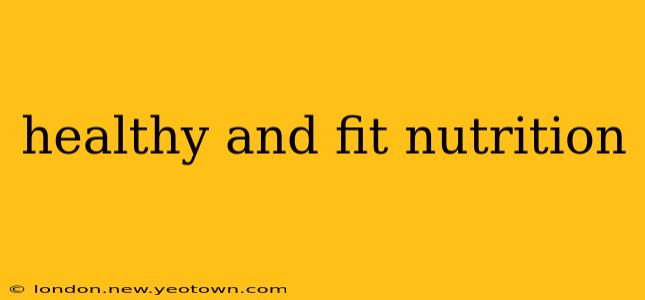The journey to a healthy and fit life is a marathon, not a sprint. While exercise plays a crucial role, the cornerstone of this journey is undoubtedly nutrition. It's about fueling your body with the right nutrients to support your energy levels, boost your immune system, and help you achieve your fitness goals. This isn't about restrictive diets or quick fixes; it's about making sustainable, informed choices that nourish your body and mind. Let's explore the key components of a nutrition plan designed for health and fitness.
What are the essential nutrients for a healthy diet?
This is a question many ask, and rightfully so! Essential nutrients are the building blocks of a healthy body. Think of them as the raw materials your body uses to build, repair, and maintain itself. These include:
-
Macronutrients: These provide energy. We have carbohydrates (providing quick energy), proteins (essential for building and repairing tissues), and healthy fats (crucial for hormone production and brain function). Focusing on complex carbohydrates (like whole grains and fruits) and lean proteins (like chicken breast, fish, and beans) is key. Healthy fats include avocados, nuts, and olive oil.
-
Micronutrients: These are vitamins and minerals, required in smaller amounts but equally vital. They play a crucial role in various bodily functions. Getting a variety of fruits and vegetables is essential to ensure you're getting a wide range of these vital micronutrients. Consider incorporating a multivitamin if you have concerns about meeting your daily requirements.
How many calories should I eat to stay healthy and fit?
Calorie needs are highly individual and depend on factors like age, gender, activity level, and metabolism. There's no one-size-fits-all answer. Instead of focusing on a specific number, concentrate on consuming a balanced diet that meets your energy needs while supporting your fitness goals. If you're aiming to lose weight, you'll need to create a calorie deficit (consuming fewer calories than you burn). Conversely, if you're aiming to gain muscle, you'll need a calorie surplus. Consulting a registered dietitian or nutritionist can help you determine your individual needs and create a personalized plan.
What are some healthy eating habits to adopt for weight loss?
Weight loss is often a primary motivator for adopting a healthier diet. However, sustainable weight loss isn't about drastic measures; it's about gradual, lifestyle changes. Here are some key habits to integrate:
-
Prioritize whole, unprocessed foods: Focus on fruits, vegetables, lean proteins, and whole grains. These foods are naturally nutrient-dense and provide sustained energy.
-
Control portion sizes: Even healthy foods can contribute to weight gain if consumed in excess. Be mindful of your portions and avoid overeating.
-
Stay hydrated: Drinking plenty of water throughout the day helps you feel full, aids digestion, and supports overall health.
-
Plan your meals: Planning your meals ahead of time can prevent impulsive unhealthy choices.
-
Limit added sugars and processed foods: These often provide empty calories with minimal nutritional value.
What are some healthy snacks to keep me energized throughout the day?
Snacking can be a valuable tool for maintaining energy levels and preventing overeating at mealtimes. Choose healthy options that provide sustained energy and crucial nutrients. Examples include:
-
Fruits and vegetables with a source of protein: An apple with peanut butter, baby carrots with hummus.
-
Greek yogurt: High in protein and calcium.
-
A handful of nuts: Provides healthy fats and protein.
-
Hard-boiled eggs: A great source of protein.
How can I make healthy eating more enjoyable and sustainable?
Healthy eating shouldn't feel like a chore! Here are some tips to make it enjoyable and sustainable:
-
Experiment with new recipes and flavors: Discover new ways to prepare healthy foods and keep your meals interesting.
-
Involve friends and family: Make healthy eating a social activity.
-
Don't deprive yourself: Allow for occasional treats in moderation. Deprivation often leads to binging.
-
Focus on progress, not perfection: Don't get discouraged by occasional setbacks.
The journey to a healthy and fit lifestyle through nutrition is a personal one. It's about finding what works best for you, making sustainable changes, and enjoying the process. Remember to consult with healthcare professionals for personalized advice and guidance. Your health is an investment worth making!

